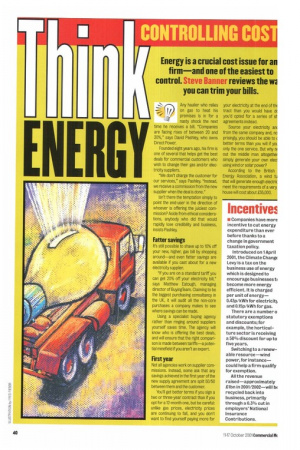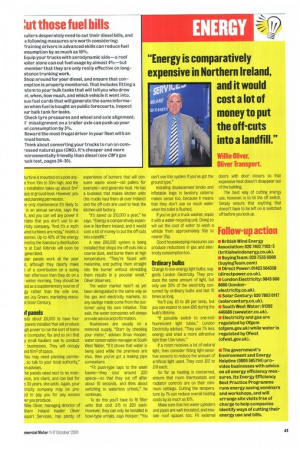Energy is a crucial cost issue for an firm—and one
Page 40

Page 41

If you've noticed an error in this article please click here to report it so we can fix it.
of the easiest to control. Steve Banner reviews the Vi2 you can trim your bills.
Any haulier who relies on gas to heat his premises is in for a nasty shock the next time he receives a bill. "Companies are facing rises of between 20 and 30%," says David Pashley, who owns Direct Power. ff Founded eight years ago, his firm is one of several that helps get the best deals for commercial customers who wish to change their gas and/or electricity suppliers.
"We don't charge the customer for our services," says Pashley. "Instead, we receive a commission from the new supplier when the deal is done."
Isn't there the temptation simply to point the end-user in the direction of whoever is offering the juiciest commission? Aside from ethical considerations, anybody who did that would rapidly lose credibility and business, insists Pashley.
Fatter savings It's still possible to shave up to 10% off your new, higher, gas bill by shopping around—and even fatter savings are available if you cast about for a new electricity supplier.
"If you are on a standard tariff you can get 20% off your electricity bill," says Matthew Eatough, managing director of BuyingTeam. Claiming to be the biggest purchasing consultancy in the UK, it will audit all the non-core purchases a company makes to see where savings can be made.
Using a specialist buying agency rather than ringing around suppliers yourself saves time. The agency will know who is offering the best deals, and will ensure that the right comparison is made between tariffs—a potential minefield if you aren't an expert.
First year Not all agencies work on supplier commissions. Instead, some ask that any savings achieved in the first year of the new supply agreement are split 50/50 between them and the customer.
You'll get better terms if you sign a two or three-year contract than if you opt for a 12-month one, but be careful: unlike gas prices, electricity prices are continuing to fall, and you don't want to find yourself paying more for your electricity at the end of thE tract than you would have ck you'd opted for a series of sr agreements instead.
Source your electricity an from the same company and, no prisingly, you should be able to c better terms than you will if yoi only the one service. But why ni out the middle man altogether simply generate your own elecl using wind or solar power?
According to the British Energy Association, a wind tu that will generate enough electric meet the requirements of a very house will cost about £35,000. turbine is mounted on a pole anye from 10m to 30m high, and the 3 installation takes up about 5m2 ace at ground level. However, you nd planning permission.
re only maintenance it's likely to is an annual service, says the A, and you can sell any power it rates that you don't use to an ricity company. "And it's a myth Hind turbines are noisy," insists a esman. Up to 40% of the energy ired by the Sainsbury distribution -e at East Kilbride will soon be generated.
olar panels work all the year d, although they clearly make 3 of a contribution on a sunny -ner afternoon than they do on a winter morning. They should be :ed as a supplementary source of igy rather than the sole one, ies Joy Green, marketing execuit Solar Century.
if panels )sts about £8,000 to have four panels installed that will produce rgh power to run the sort of home e (computer, fax and so on) that y small hauliers use to conduct businesses. They will occupy Ind 10m2 of space.
You may need planning permis, so talk to your local authorrty," an advises.
he panels need next to no mainince, are silent, and can last for o 30 years, she adds. Again, your itricity company may be pread to pay you for any excess ier you produce.
iIlie Oliver, managing director of them Ireland haulier Oliver isport Services, has plenty of experience of burners that will consume waste wood—old pallets for example—and generate heat. He has a business that makes kitchen units (his trucks haul them all over Ireland) and the off-cuts are used to heat the kitchen unit factory.
"It's saved us £10,000 a year," he says. "Energy is comparatively expensive in Northern Ireland. and it would cost a lot of money to put the off-cuts into a landfill."
A new £50,000 system is being installed that chops the off-cuts into a coarse dust, and burns them at high temperature. "They're faced with melamine, and putting them straight into the burner without shredding them results in a peculiar smell," Oliver observes.
The water market hasn't as yet been deregulated in the same way as the gas and electricity markets, so any savings made come from the customer using his own initiative. That said, the water companies will always provide advice and information.
Businesses are usually on a metered supply. "Start by checking your meter," advises Brian Hooper, water conservation manager at South West Water. "If it shows that water is being used while the premises are shut, then you've got a leaking pipe somewhere.
"Fit push-type taps to the wash basins—they cost around £20 apiece—so that they cut off after about 10 seconds, and think about switching to waterless urinals," he continues.
To do this you'll have to fit filter units that cost £15 to £20 each. However, they can only be installed in bowl-type urinals, says Hooper: "You can't use this system if you've got the ground type."
Installing displacement bricks and inflatable bags in lavatory cisterns makes sense too, because it means that they don't use so much water when the toilet is flushed.
If you've got a truck washer, equip it with a water-recycling unit. Doing so will cut the cost of water to wash a vehicle from approximately 50p to nearer 25p.
Good housekeeping measures can produce reductions in gas and electricity consumption too.
Ordinary bulbs Change to low-energy light bulbs, suggests London Electricity. They produce the same amount of light, but only use 20% of the electricity consumed by ordinary bulbs and last 10 times as long.
You'll pay £5 to .£9 per lamp, but you can expect to save £50 during the bulb's lifetime.
"If possible switch to one-inch fluorescent light tubes," London Electricity advises. "They use 7% less energy and shed a more attractive light than 1.5in tubes."
If a room receives a lot of natural light, then consider fitting light-sensitive sensors to reduce the amount of artificial light used. They cost 112 to £18 each.
So far as heating is concerned, ensure that room thermostats arid radiator controls are on their minimum settings. Cutting the temperature by 1% can reduce overall heating costs by as much as 10%.
Make sure that hot water cylinders and pipes are well-insulated, and insulate roof spaces too. Fit external doors with door closers so that expensive heat doesn't disappear out of the building.
The best way of cutting energy use, however, is to hit the off switch. Simply ensure that anything that doesn't have to be left on is switched off before you lock up.
Follow-up action
• British Wind Energy Association: 020 7402 7102/3 (britishwindenergy.co.uk).
• BuyingTeam: 020 7535 6000 (buyingTeam.com)
II Direct Power: 01423 564358 (directpowerco.uk).
London Electricity: 0845 600 8080 (london electricity.co.uk).
II Solar Century: 020 7803 0117 (solarcentury.co.uk).
• South West Water: 01392 446688 (swwater.co.uk).
• Electricity and gas are regulated by Ofgem (ofgem.gov.uk) while water is regulated by Ofwat (ofwat.gov.uk).
• The government's Environment and Energy Helpline (0800 585794) provides businesses with advice on all energy efficiency measures. Its Energy Efficiency Best Practice Programme runs energy saving seminars and workshops, and will arrange site visits free of charge to help companies identify ways of cutting their energy use and bills.








































































































































